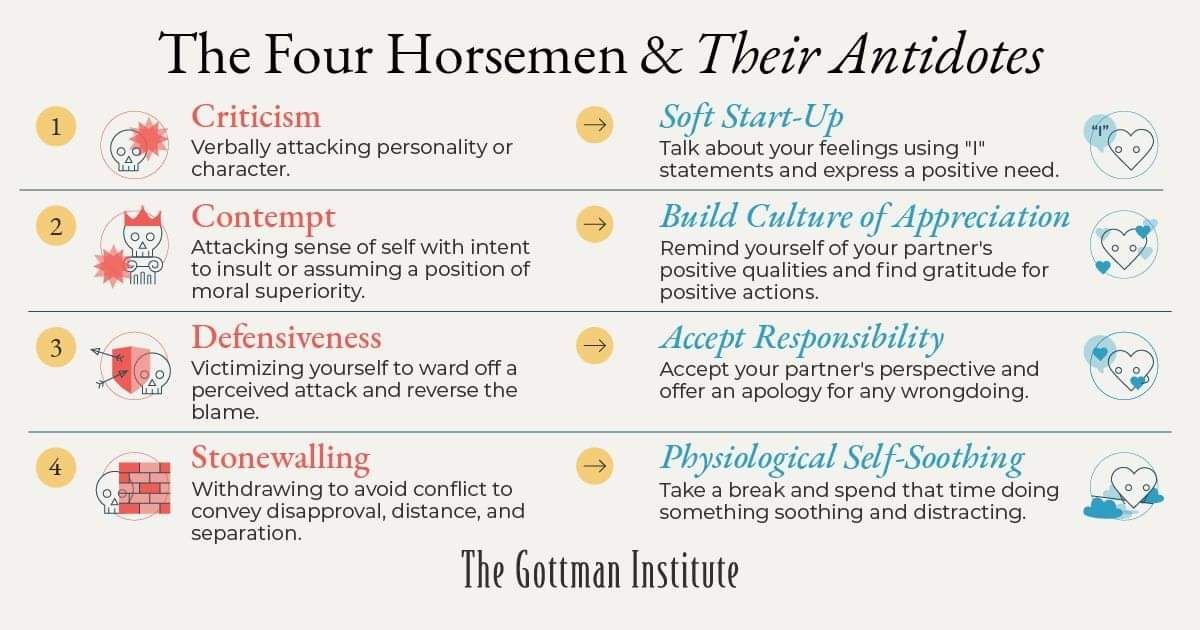The Four Horsemen and Their Antidotes
In my previous article, I talked about the four negative communication styles that are destructive to your relationship with your partner (spouse). If you are not familiar with these four negative communication styles, you can read this post [insert the blog web page]. In this blog I will provide you with the antidote to each type of the Horsemen.
The Antidote for Criticism: Gentle Start-up
Because becoming critical can imply that there is something wrong with our partner’s character, a gentle start-up is the antidote to criticism. Starting the conversations with your partner gently is a way to decrease the likelihood of turning your interactions with your partner into arguments or defensiveness. For instance, instead of starting sentences like “You always do X”, “Why do you always X”, a gentle start-up way sounds like inquiries with a neutral tone. It also conveys a sense of respect to the other person. For instance, “I’m wondering why the dishes are still on the counter? I’m under the impression that you would put away those dishes.” Or it can start with the phrases like “I noticed X”, “I sense X”.
The Antidote for Defensiveness: Taking Responsibility
Defensiveness is an attempt to protect oneself, to defend one’s innocence to ward off a perceived attack. The antidote to defensiveness is to accept responsibility for at least a small part of the problem.
Dr. Gottman emphasized that instead of defensiveness, those who take responsibility to hear their partner show that at least they are willing to acknowledge and validate their partner’s concern. For instance, instead of defending your partner about being late for your date night due to an unexpected last minute meeting at work, a non-depensive way to respond to your partner may sound “you’re right. If I were you, I’d have felt upset and felt that your work is more important than me.”
The Antidote for Contempt: Describing Your Feelings and Needs and Express Your Appreciation
Contempt is any critical statement you make when you feel superior to your partner. It is an attitude like “I’m better/ smarter/ more capable than you are.” Contempt is the single best predictor of divorce in heterosexual couples or break up in same-sex couples.
To overcome contempt, firstly, it is important that partners who show contempt learn to explore their past experiences that lead them to feel angry and/or act aggressively toward their partner. Understanding what internal negative feelings are being triggered is the first step. Secondly, after recognizing triggers and feelings, honestly expressing emotional needs or wants to their partner in a positive way rather than demands . For instance, I’m being let down by your lateness to our anniversary dinner, and I want you to respect me by being punctual so that I know I do matter to you.
Another way to overcome contempt is to get into the habit of scanning for qualities or actions that you can appreciate your partner during most of the time when you are not in conflict with your partner. Expressing and showing appreciation to your partner helps to increase positive interactions and in turn to help your partner perceive you more positively. By simply reminding yourself of your partner’s positive qualities, it helps you maintain a sense of respect and that slows down your intimate relationship from deteriorating.
The Antidote for Stonewalling: To Self-sooth
When stonewalling happens, the listener withdraws from the interactions while staying in the room. Although the listener is physically there, he/she may not “get” to and/ or respond to what the other partner is saying. When stonewalling occurs frequently, the couple turns away from each other and over time both partners feel disconnected and separation or divorce could be predicted according to Gottman. Therefore, the antidote to stonewalling is to self-sooth and try to stay connected in the interaction. Self-soothing can be taking a few deep breaths, or when you feel too overwhelmed, you can initiate to express your needs to take a break or ask for your partner to give you space and return to communicate with your partner after you calm down as soon as possible.
